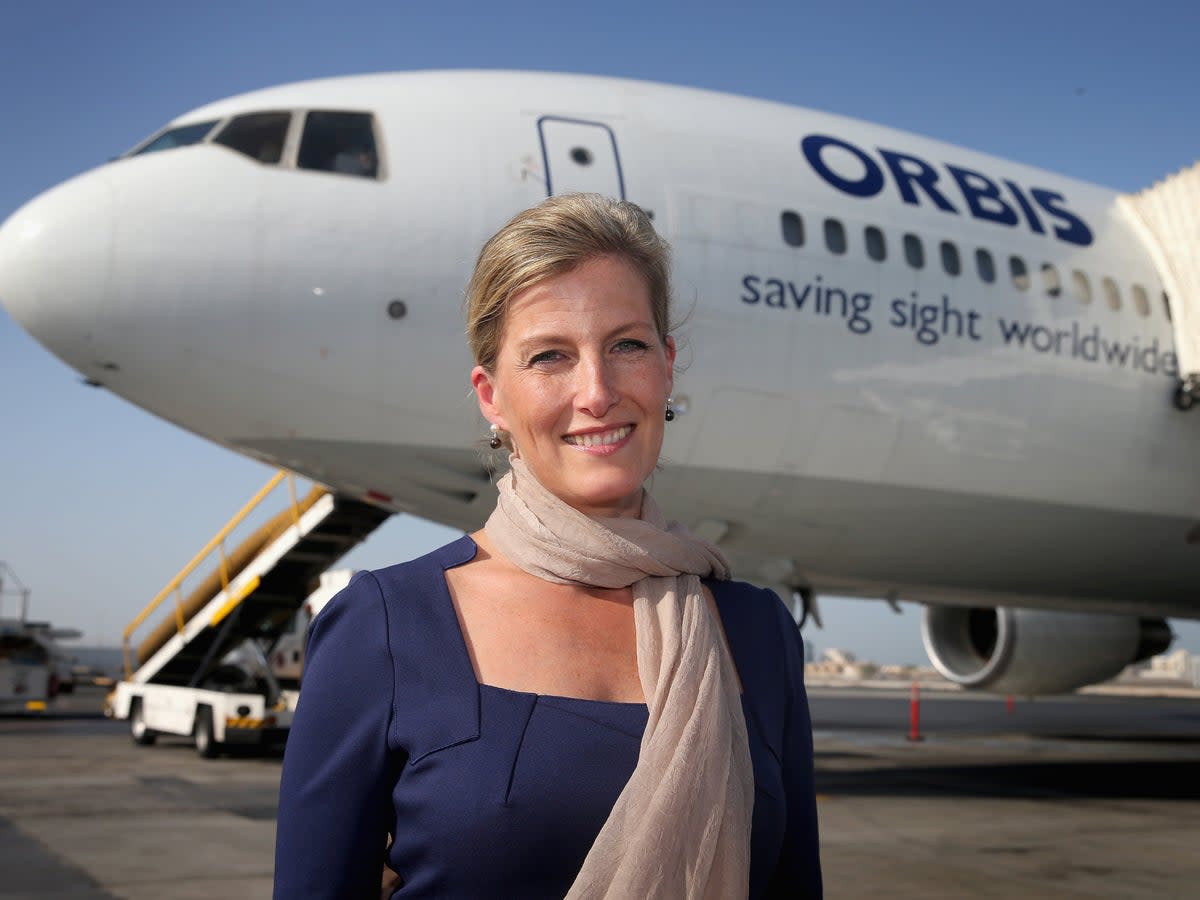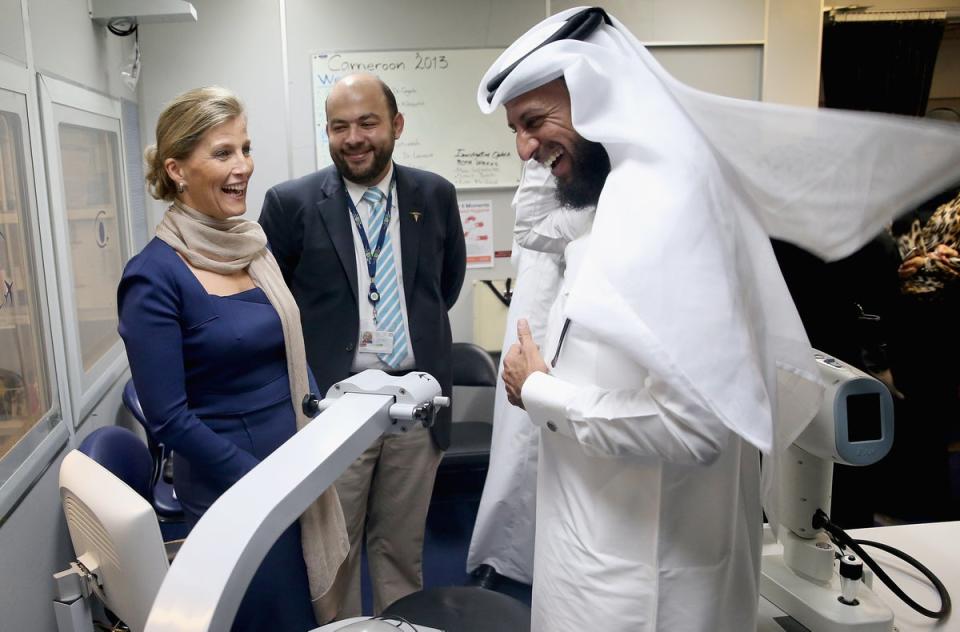UK charity championed by Countess of Wessex accepted £5m from Qatar despite human rights concerns

A UK charity championed by Sophie, Countess of Wessex, has been handed more than £5m from a Qatar state body despite human rights concerns in the Gulf country, it can be revealed.
Eyecare charity Orbis UK has been given just over £5.8m in grants by Qatar Fund for Development (QFFD) in six years, according to an analysis of the charity’s accounts. QFFD describes itself as “a public development institution committed, on behalf of the State of Qatar, to implement external aid projects”.
The charity’s own aim as an employer that “everyone is treated fairly and with respect” contrasts with the situation in oil-rich Qatar where human rights concerns have been brought into sharp focus ahead of the country hosting the World Cup next month.
In Qatar, male homosexuality is illegal, women’s rights are suppressed and the treatment of migrant workers has prompted frequent concern from human rights campaigners.
Nick McGeehan, a director at non-profit human rights organisation FairSquare Projects, said: “I think this funding falls into the bracket of charitable grants that provide as much benefit to the donor as the recipient and helps Qatar burnish its reputation.
“I don’t think it’s about erasing human rights concerns but I think it is about promoting a certain narrative about Qatar and promoting the brand of Qatar,” he continued. “That unquestionably sits within the realm of what we might call public relations, not strictly just charity.
“Every country has a right to donate funds for charitable, humanitarian purposes and I think that charities have an understandable right and desire to look for that kind of money. But that comes with a very big caveat and I think what charities have to very carefully weigh up and do due diligence on, are the precise motives of their funders.”
Orbis’s website details how in 2015, as ambassador for the International Agency for the Prevention of Blindness (IAPB), the countess – married to Prince Edward – “travelled to Qatar to discuss the global issues around preventable blindness and the need for funding for eye health programmes”.

The website adds that “Qatar’s interest in this area resulted in the creation of the Qatar Creating Vison [sic] initiative, a sight-saving programme funded by the Qatar Fund for Development and implemented by Orbis”.
Since then, millions of pounds have flowed into the charity’s coffers from QFFD in grants for Qatar Creating Vision – with accounts for Orbis UK showing it received £334,050 in the year ended 31 December 2015, rising to £1,373,706 in 2016, £1,538,659 in 2017, £1,446,389 in 2018, £1,136,958 in 2019 and £30,020 in 2020.
The royal family’s website detailed that the countess visited Qatar in September 2013 in her IAPB ambassador role, adding: “The Countess of Wessex’s knowledge, passion and vision for a world where no one is needlessly blind encouraged the conversation between representatives of the State of Qatar and international NGO members of the International Agency for the Prevention of Blindness. These conversations resulted in the Qatar Creating Vision initiative.
“On World Sight Day 2015, during Her Royal Highness’s follow-up visit to Qatar, the Qatar Development Fund (QDF) pledged an investment of $8,000,000 to the Qatar Creating Vision initiative.”
The role of the countess, described on the royal family’s website as being “passionate about supporting women and championing gender equality”, comes despite Qatar’s limiting of women’s liberty.
A report last year by Human Rights Watch found that women in Qatar “continue to face deep discrimination in almost all aspects of their lives”.

According to Orbis’s website, the launch of Qatar Creating Vision was “celebrated” by the countess at Buckingham Palace in 2015, “alongside dignitaries from Qatar and the UK”.
The charity’s website further details how in 2019 the Countess was “joined by His Excellency Sheikh Thani Al Thani, on behalf of the Amir of the State of Qatar, to celebrate the Qatar Fund for Development and the Qatar Creating Vision’s achievements at St James Palace”.
During a virtual event last year, the countess spoke in support of Orbis, praising its work. And in January, the royal visited Qatar Fund for Development in Doha.
In 2015, state-owned Qatar Airways became “the official partner airline of Orbis UK”, providing complimentary flights as well as “providing Orbis with free landing, parking and ground handling services whenever we land in Qatar”, according to the charity’s website which also notes that the airline has been “supporting” it since 2012.
Orbis UK told The Independent it had received gift-in-kind support of flights between 2015 and 2022 from Qatar Airways valued at a total of £108,228, adding: “In 2012 and 2013, Qatar Airways Group provided support facilitating the stop-over of the Flying Eye Hospital before its onward journeys around the world.”
The charity said Qatar Airways Group also promoted World Sight Day in 2014, “carrying Orbis messaging on their airport advertising screens”.
Orbis UK said: “QFFD and Orbis UK share a goal to prevent and treat avoidable blindness in areas where people do not have access to the eye care they need. Globally there are 1.1 billion people in the world who are blind or visually impaired, yet 90 per cent of cases are avoidable. Without intervention and impactful partnerships, the figure is forecast to increase to 1.8 billion people by 2050.
“As a result of the ‘Qatar Creating Vision’ partnership, over 6.7 million eye tests and treatments have been delivered across India and Bangladesh, including the provision of eye care services for children and adults within the Rohingya community and local communities of southeast Bangladesh.”
Asked whether any ethical considerations were made by the charity’s trustees or senior staff before deciding to accept funds from QFFD, the charity said: “Orbis UK undertook due diligence, as part of the trustee and senior management decision-making process, to partner with the Qatar Fund for Development on our shared goal of preventing and treating avoidable blindness in areas where people do not have access to the eye care they need.”
Orbis UK added: “This year, Orbis UK has received $101,756 from the Qatar Fund for Development for an eye care project in Ethiopia. The work is helping to tackle trachoma – the leading infectious cause of blindness worldwide – while providing comprehensive vision loss services and training for eye care professionals. Over the duration of the project, Orbis UK will receive $408,784.
“Orbis UK and Qatar Fund for Development are working together to achieve our shared goal of preventing avoidable blindness in areas where people do not have access to the eye care they need, and we are currently in discussions regarding the delivery and funding of further programmes.”
A Qatari government official said: “Qatar donates to trusted charities around the world to alleviate suffering and meet the needs of the most vulnerable people in society. Qatar Fund for Development’s funding to Orbis has helped to transform the lives of millions of people through the prevention and treatment of avoidable blindness.”
A Qatar Airways spokesperson said: “Qatar Airways is proud to have been a strong supporter of Orbis UK for 10 years and helping to save the sight of so many children during this time. Being in a position to support such an important charity is a privilege that we take seriously and we applaud the efforts of Orbis UK as it works tirelessly to expand its blindness prevention programme.”
Asked why, in light of the human rights concerns in Qatar, the Countess of Wessex decided to play a role in helping Orbis UK receive funds from QFFD, a Buckingham Palace spokesperson said that “this would be a matter for Orbis”.
QFFD was contacted for comment.

